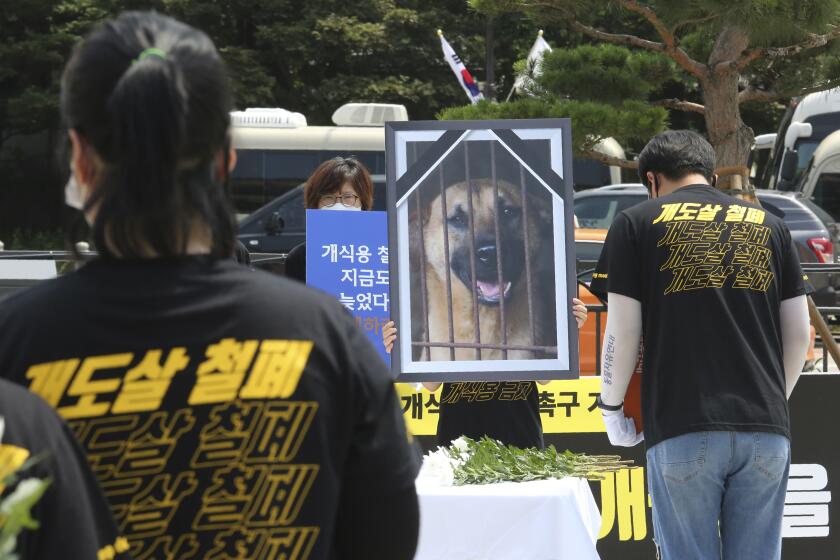South Korean farmers rally near presidential office to protest proposed anti-dog meat law

SEOUL — Dozens of South Korean dog farmers scuffled with police during a rally near the presidential office on Thursday to protest a push by authorities to outlaw dog meat consumption.
Earlier this month, government and ruling party officials agreed to introduce legislation by year’s end that would ban the centuries-old practice. Individual lawmakers have submitted similar anti-dog meat bills in the past, but this would be the first time for the government to back such legislation.
About 200 farmers, restaurant owners and others involved in the dog meat industry gathered for Thursday’s rally. They chanted slogans, sang, raised their fists and took turns making speeches criticizing the government’s move. One protester said he would kill himself if the government and governing party move ahead with the legislation.
“We’ll fight. We’ll fight,” the protesters shouted.
Some farmers brought dogs in cages on their trucks but were prevented from taking them to the protest site. A shoving match between some protesters and police occurred, with some farmers rushing to a street when a truck, apparently carrying dogs, approached.
Dog meat is neither legal nor explicitly banned in South Korea, and consumption is dwindling, but some still believe it has health benefits.
Police detained three protesters, farmers said. Police said they couldn’t immediately confirm the detentions.
Dog meat consumption is neither explicitly banned nor legaliz in South Korea. But there have been calls to prohibit it over worries about South Korea’s international image and a growing public awareness of animal rights. World celebrities including American actress Kim Basinger and French actress Brigitte Bardot have called for a ban.
The bill pushed by the government and governing party would phase out the dog meat industry by 2027. It would provide financial support to farmers for dismantling their facilities and opening new businesses and offer vocational training and other benefits.
“To have a government-backed bill with the political will behind it to see it passed swiftly is a highly significant milestone, a point we have never reached before in this campaign to phase out this abusive industry,” the anti-animal cruelty group Humane Society International’s Korea office said in written responses to questions from the Associated Press.
Twenty-nine dogs that were once part of a “meat farm” in South Korea arrived Thursday in San Diego for possible adoption, part of a Humane Society program that hopes to end the Korean tradition of eating dog meat.
The anti-dog meat campaign in South Korea recently gathered new momentum as the nation’s first lady, Kim Keon Hee, a pet lover, repeatedly voiced her support for a ban. During Thursday’s rally, protesters made crude insults of Kim.
Famers are calling for a longer grace period and direct financial compensation for giving up their dogs. They also say their businesses will naturally disappear when older people, their main customers, die.
“Most dog meat industry workers are in their 60s and 70s, which means they are seeking retirement, not new occupations. Since few young Koreans eat dog meat, the practice will fade away in the next 15 to 20 years anyhow,” said Ju Yeongbong, a former secretary general of a dog farmers’ association who attended Thursday’s rally.
About 700,000 to 1 million dogs are slaughtered for consumption each year, a decline from several million 10 to 20 years ago, according to the association. Some activists say the farmers’ estimates are inflated to try to show that the industry is too big to destroy.
Associated Press writer Hyung-jin Kim contributed to this report.
More to Read
Sign up for Essential California
The most important California stories and recommendations in your inbox every morning.
You may occasionally receive promotional content from the Los Angeles Times.











